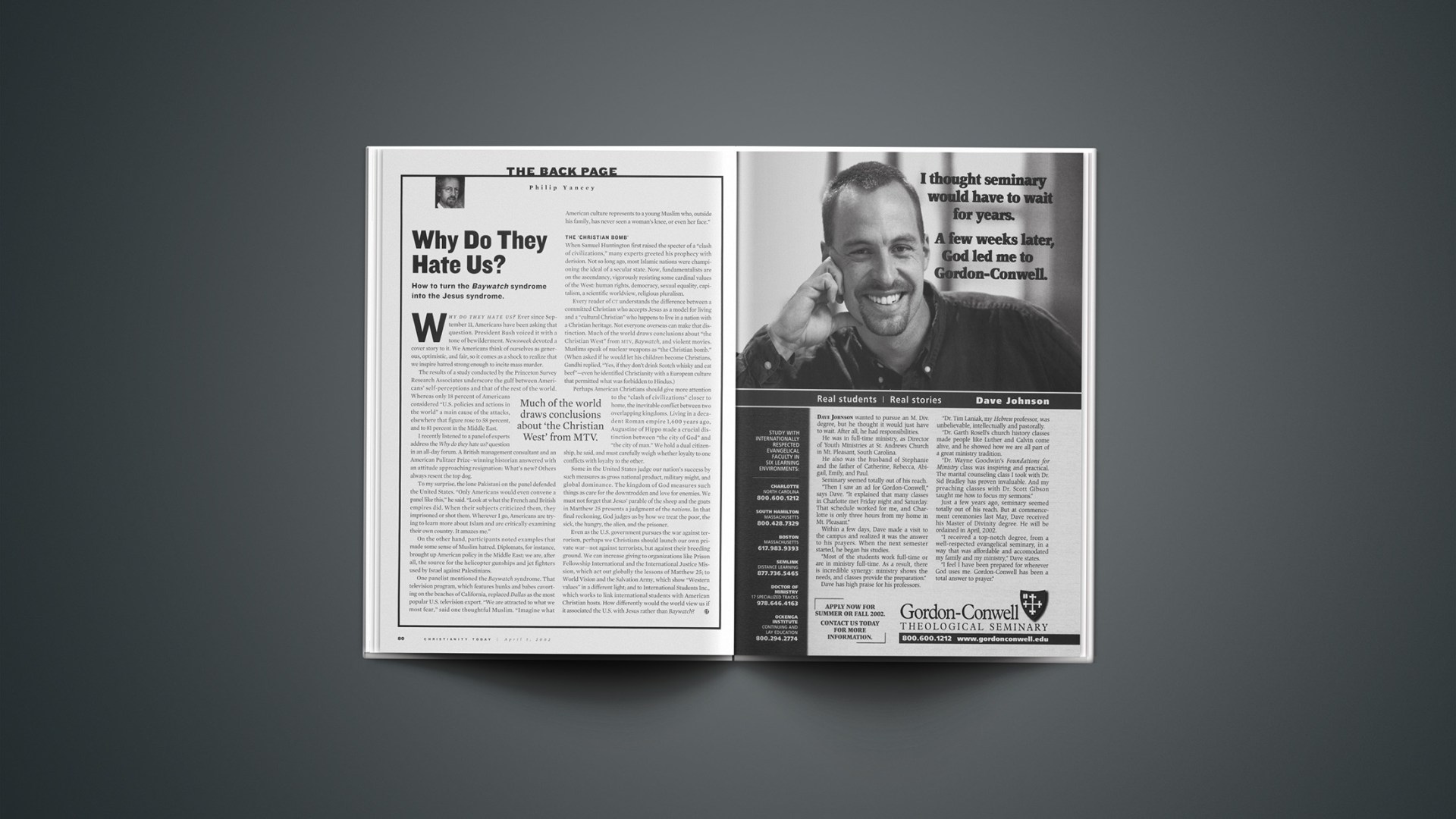Why do they hate us? Ever since September 11, Americans have been asking that question. President Bush voiced it with a tone of bewilderment. Newsweek devoted a cover story to it. We Americans think of ourselves as generous, optimistic, and fair, so it comes as a shock to realize that we inspire hatred strong enough to incite mass murder.
The results of a study conducted by the Princeton Survey Research Associates underscore the gulf between Americans’ self-perceptions and that of the rest of the world. Whereas only 18 percent of Americans considered “U.S. policies and actions in the world” a main cause of the attacks, elsewhere that figure rose to 58 percent, and to 81 percent in the Middle East.
I recently listened to a panel of experts address the Why do they hate us? question in an all-day forum. A British management consultant and an American Pulitzer Prize-winning historian answered with an attitude approaching resignation: What’s new? Others always resent the top dog.
To my surprise, the lone Pakistani on the panel defended the United States. “Only Americans would even convene a panel like this,” he said. “Look at what the French and British empires did. When their subjects criticized them, they imprisoned or shot them. Wherever I go, Americans are trying to learn more about Islam and are critically examining their own country. It amazes me.”
On the other hand, participants noted examples that made some sense of Muslim hatred. Diplomats, for instance, brought up American policy in the Middle East; we are, after all, the source for the helicopter gunships and jet fighters used by Israel against Palestinians.
One panelist mentioned the Baywatch syndrome. That television program, which features hunks and babes cavorting on the beaches of California, replaced Dallas as the most popular U.S. television export. “We are attracted to what we most fear,” said one thoughtful Muslim. “Imagine what American culture represents to a young Muslim who, outside his family, has never seen a woman’s knee, or even her face.”
The ‘Christian Bomb’
When Samuel Huntington first raised the specter of a “clash of civilizations,” many experts greeted his prophecy with derision. Not so long ago, most Islamic nations were championing the ideal of a secular state. Now, fundamentalists are on the ascendancy, vigorously resisting some cardinal values of the West: human rights, democracy, sexual equality, capitalism, a scientific worldview, religious pluralism.
Every reader of CT understands the difference between a committed Christian who accepts Jesus as a model for living and a “cultural Christian” who happens to live in a nation with a Christian heritage. Not everyone overseas can make that distinction. Much of the world draws conclusions about “the Christian West” from MTV, Baywatch, and violent movies. Muslims speak of nuclear weapons as “the Christian bomb.” (When asked if he would let his children become Christians, Gandhi replied, “Yes, if they don’t drink Scotch whisky and eat beef”—even he identified Christianity with a European culture that permitted what was forbidden to Hindus.)
Perhaps American Christians should give more attention to the “clash of civilizations” closer to home, the inevitable conflict between two overlapping kingdoms. Living in a decadent Roman empire 1,600 years ago, Augustine of Hippo made a crucial distinction between “the city of God” and “the city of man.” We hold a dual citizenship, he said, and must carefully weigh whether loyalty to one conflicts with loyalty to the other.
Some in the United States judge our nation’s success by such measures as gross national product, military might, and global dominance. The kingdom of God measures such things as care for the downtrodden and love for enemies. We must not forget that Jesus’ parable of the sheep and the goats in Matthew 25 presents a judgment of the nations. In that final reckoning, God judges us by how we treat the poor, the sick, the hungry, the alien, and the prisoner.
Even as the U.S. government pursues the war against terrorism, perhaps we Christians should launch our own private war—not against terrorists, but against their breeding ground. We can increase giving to organizations like Prison Fellowship International and the International Justice Mission, which act out globally the lessons of Matthew 25; to World Vision and the Salvation Army, which show “Western values” in a different light; and to International Students Inc., which works to link international students with American Christian hosts. How differently would the world view us if it associated the U.S. with Jesus rather than Baywatch?
Copyright © 2002 Christianity Today. Click for reprint information.
Related Elsewhere
Philip Yancey’s previous reflections on September 11 include:
I Was Just Wondering … Twenty questions that nag me after September 11. (Feb. 18, 2002)
Where Was God on 9/11?Reflections from Ground Zero and beyond. (October 23, 2001)
Letter from a Muslim SeekerChristians aren’t the only ones asking ‘Why?’ after September’s tragedy. (December 5, 2001)
Previous Yancey columns for Christianity Today include:
Honest Church MarketingWe enhance our ‘image’ by offering the world a realistic picture of faith. (October 24, 2001)
Compassion ConfusionWe should serve the needy even when it has bad political consequences. (August 28, 2001)
Fixing Our Weakest LinkEvangelicals should be more “needful of the minds of others.” (July 13, 2001)
Replenishing the Inner PastorChurches should take greater interest in their shepherds’ spiritual health. (May 14, 2001)
Beyond Flesh and BloodI used to disdain biblical talk of “invisible spirits.” No more. (Mar. 27, 2001)
God at LargeA look around the globe reveals a God as big as we want him to be. (Jan. 31, 2001)
Humility’s Many FacesEveryone I’ve looked up to has shared one trait. (Dec. 4, 2000)
Getting a LifeThe most fully alive persons are those who give their lives away. (Oct. 16, 2000)
Yancey’s Where is God When it Hurts, Special Edition and Soul Survivor: How My Faith Survived the Church are available on Christianbook.com










